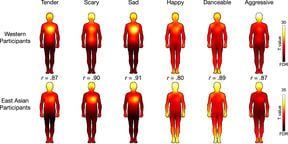Music causes similar emotions and bodily sensations across cultures

Music can be felt directly in the body. When we hear our favourite catchy song, we are overcome by the urge to move to the music. Music can activate our autonomic nervous system and even send shivers down your spine. A new study shows how emotional music evokes these bodily sensations and how the response is similar across cultures.
’Music that evoked different emotions, such as happiness, sadness or fear, caused different bodily sensations in our study. For example, happy and danceable music was felt in the arms and legs, while tender and sad music was felt in the chest area,’ explains Academy Research Fellow Vesa Putkinen from the Turku PET Centre.
The study asked 1,500 Western and Asian participants to rate the emotions and bodily sensations evoked by Western and Asian songs through an online questionnaire. The emotions and bodily sensations evoked by music were similar between Western and Asian listeners. The bodily sensations were also linked with music-induced emotions.
‘Certain acoustic features of music were associated with similar emotions in both Western and Asian listeners. Music with a clear beat was found happy and danceable, while dissonance in music was associated with aggressiveness. Since these sensations are similar across different cultures, music-induced emotions are likely independent of culture and learning and are instead based on inherited biological mechanisms,’ says Professor Lauri Nummenmaa from the Turku PET Centre.
‘Music’s influence on the body is universal. People move to music in all cultures, and synchronized postures, movements and vocalizations are a universal sign of affiliation. Music may have emerged during the evolution of human species to promote social interaction and create a sense of community by synchronising the bodies and emotions of the listeners,’ continues Putkinen.
Aalto University Professor Mikko Sams finds it is surprising that Western and Asian pop music produce similar sensations.
‘I assume that there is a common component in music that works in the same way regardless of culture and can actually help people understand each other around the world,’ says Sams. His research team - in collaboration with the University of Helsinki - are currently studying the experience of emotions in ancient Mesopotamia using cuneiform inscriptions.
The study was carried out at the Turku PET Centre, Aalto University and the University of Electronic Science and Technology of China (UESTC) and funded by the Research Council of Finland. The results of the study were published on 25 January 2024 in the Proceedings of the National Academy of Sciences of the United States of America (PNAS) journal.
Contact information:

- Published:
- Updated:
Read more news

Aalto Open Science Award ceremony brought together Aaltonians to discuss open science
Last week we gathered at A Grid to celebrate the awardees of the Aalto Open Science Award 2023 and discuss open science matters with the Aalto community.
Seed funding available to boost collaboration between Aalto, KU Leuven and University of Helsinki
Aalto University, KU Leuven and the University of Helsinki launch the 2nd exploratory seed funding call to explore research collaboration possibilities. The funding call is open until 10 September 2024.
Professor Peter Hans Matthews works as a Fulbright-Aalto Distinguished Chair scholarship holder at the Department of Economics
Fulbright programmes and scholarships are highly appreciated in the United States